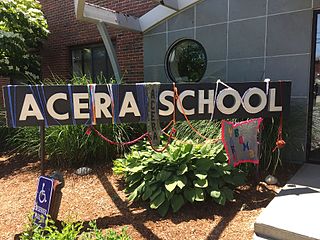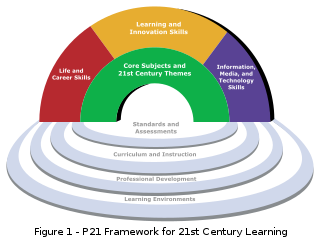The following outline is provided as an overview of and topical guide to education:

Interdisciplinarity or interdisciplinary studies involves the combination of multiple academic disciplines into one activity. It draws knowledge from several fields like sociology, anthropology, psychology, economics, etc. It is related to an interdiscipline or an interdisciplinary field, which is an organizational unit that crosses traditional boundaries between academic disciplines or schools of thought, as new needs and professions emerge. Large engineering teams are usually interdisciplinary, as a power station or mobile phone or other project requires the melding of several specialties. However, the term "interdisciplinary" is sometimes confined to academic settings.
Media literacy is an expanded conceptualization of literacy that includes the ability to access and analyze media messages as well as create, reflect and take action, using the power of information and communication to make a difference in the world. Media literacy applies to different types of media and is seen as important skills for work, life, and citizenship.
Critical thinking is the analysis of available facts, evidence, observations, and arguments in order to form a judgement by the application of rational, skeptical, and unbiased analyses and evaluation. The application of critical thinking includes self-directed, self-disciplined, self-monitored, and self-corrective habits of the mind; thus, a critical thinker is a person who practices the skills of critical thinking or has been trained and educated in its disciplines. Philosopher Richard W. Paul said that the mind of a critical thinker engages the person's intellectual abilities and personality traits. Critical thinking presupposes assent to rigorous standards of excellence and mindful command of their use in effective communication and problem solving, and a commitment to overcome egocentrism and sociocentrism.
The Association of College and Research Libraries defines information literacy as a "set of integrated abilities encompassing the reflective discovery of information, the understanding of how information is produced and valued and the use of information in creating new knowledge and participating ethically in communities of learning". In the United Kingdom, the Chartered Institute of Library and Information Professionals' definition also makes reference to knowing both "when" and "why" information is needed.
The Five Colleges of Ohio, Inc. is an American academic and administrative consortium of five private liberal arts colleges in the state of Ohio. It is a nonprofit educational consortium established in 1995 to promote the broad educational and cultural objectives of its member institutions.

Open educational resources (OER) are teaching, learning, and research materials intentionally created and licensed to be free for the end user to own, share, and in most cases, modify. The term "OER" describes publicly accessible materials and resources for any user to use, re-mix, improve, and redistribute under some licenses. These are designed to reduce accessibility barriers by implementing best practices in teaching and to be adapted for local unique contexts.
This is an index of education articles.

Jeremy J. Shapiro, is an American academic, educational performance artist, translator, and activist. He is professor emeritus at Fielding Graduate University and works in the area of critical social theory with emphasis on the social and cultural effects of information technology and systems, social change, and the aesthetics of music. His main intellectual products/innovations include
Integrative learning is a learning theory describing a movement toward integrated lessons helping students make connections across curricula. This higher education concept is distinct from the elementary and high school "integrated curriculum" movement.

Public education in Saudi Arabia—from primary education through college—is open to every Saudi citizen. Education is the second-largest sector of government spending in Saudi Arabia. Saudi Arabia spends 8.8% of its gross domestic product on education, which is nearly double the global average of 4.6%. Saudi Arabia is an Islamic country and therefore Islam is interwoven in every part of society, also in education. Islamic studies are part of the education system alongside scientific and social studies that vary from educational institution to another. Important goals of education in Saudi Arabia are to teach the students the economic, religious and social norms of the country. They also want to reduce the high illiteracy. The education system consists of 3 levels: primary education, intermediate education and secondary education.
Place-based education, sometimes called pedagogy of place, place-based learning, experiential education, community-based education, environmental education or more rarely, service learning, is an educational philosophy. The term was coined in the early 1990s by Laurie Lane-Zucker of The Orion Society and Dr. John Elder of Middlebury College. Orion's early work in the area of place-based education was funded by the Geraldine R. Dodge Foundation. Although educators have used its principles for some time, the approach was developed initially by The Orion Society, a Massachusetts-based nonprofit organization, as well as Professor David Sobel, Project Director at Antioch University New England.

Transliteracy is "a fluidity of movement across a range of technologies, media and contexts". It is an ability to use diverse techniques to collaborate across different social groups.

The University of Pennsylvania Graduate School of Education, commonly known as Penn GSE, is an Ivy League top-ranked educational research school in the United States. Formally established as a department in 1893 and a school at the University of Pennsylvania in 1915, Penn GSE has historically had research strengths in teaching and learning, the cultural contexts of education, language education, quantitative research methods, and practitioner inquiry. Katharine Strunk is the current dean of Penn GSE; she succeeded Pam Grossman in 2023.
Susan Neuman is an educator, researcher, and education policy-maker in early childhood and literacy development. In 2013, she became Professor of Early Childhood and Literacy Education, and Chair of the Department of Teaching and Learning at NYU's Steinhardt School of Culture, Education, and Human Development.

The Acera School is an independent, nonprofit, co-educational day school in Winchester, Massachusetts, United States, serving gifted students across Greater Boston in grades K–8 with the option for a bonus Grade 9. Acera's approach to gifted education is centered around engaging students in meaningful learning given each students’ unique capacities, needs, and passions. Its teachers emphasize the development of core capacities such as systems thinking, critical thinking and problem solving, creativity, ethical decision making, perspective taking, collaboration, emotional intelligence, and leadership.
The Partnerships Advancing Library Media (PALM) Center is a research institute at Florida State University (FSU) in Tallahassee, Florida, United States. The center was established as a joint effort of the FSU Learning Systems Institute, College of Communication and Information and the College of Education. The Center engages in research and evaluation focused on school librarians ranging from large-scale surveys and evaluation of program implementation, to case studies of school libraries.
Global education is a mental development program that seeks to improve global human development based on the understanding of global dynamics, through the various sectors of human development delivery. In formal education, as a mode of human development delivery, it is integrated into formal educational programs, as an advanced program where global dimensions to local problems are appreciated through interconnectivity. Its first phase began as an undertaking to restructure education and society in the 1960s and 1970s, through the initiatives of educationalists, NGOs and intergovernmental organizations. The program evolves with the internet, and is in its virtual interconnectivity phase, through social media and other global public spheres. This global approach to mental development, seeks to fix the failing curriculum-based global education program that is: stuck in limited subject knowledge, based on theories that have failed the world ;hinged on memorization without visual exposure to knowledge development resources and global culture, limited by access to human development resources. Instead, the program seeks to improve the global mental resources pool through the appreciation of global dynamics and local perspectives on issues. This is through alternative motivations for global human development, and alternative global futures hinged on interconnectivity.

21st century skills comprise skills, abilities, and learning dispositions identified as requirements for success in 21st century society and workplaces by educators, business leaders, academics, and governmental agencies. This is part of an international movement focusing on the skills required for students to prepare for workplace success in a rapidly changing, digital society. Many of these skills are associated with deeper learning, which is based on mastering skills such as analytic reasoning, complex problem solving, and teamwork, which differ from traditional academic skills as these are not content knowledge-based.







